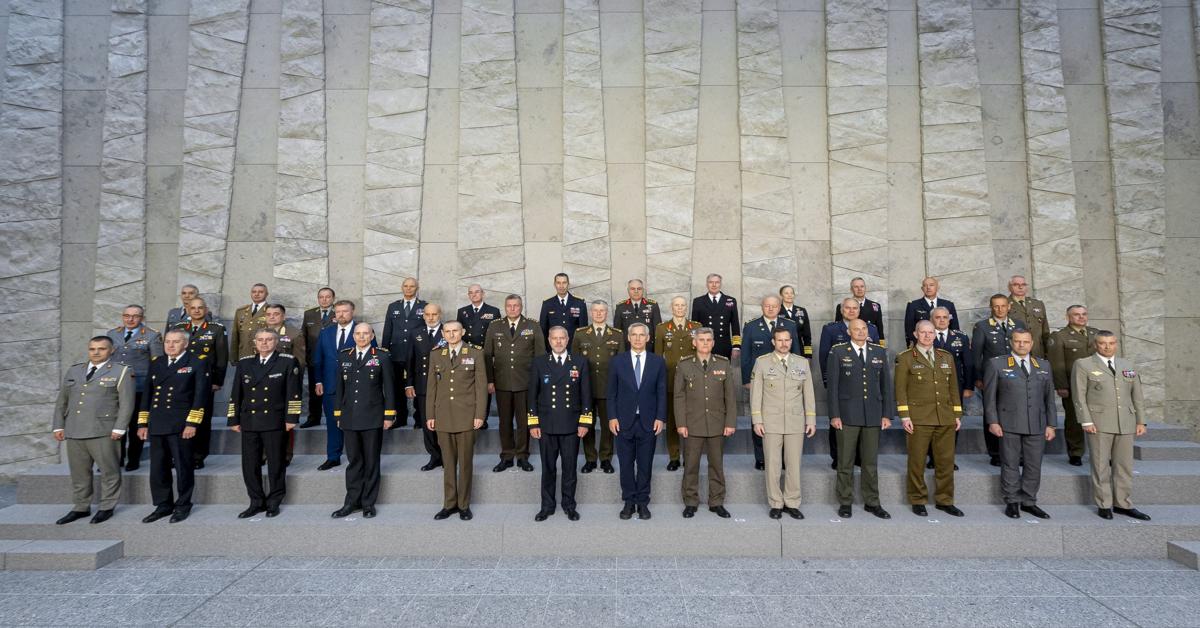
NATO chiefs of staff convened to discuss the transformation of the alliance, the implementation of new defense plans, and the latest developments in the Russia-Ukraine war
The Chiefs of Staff of the 32 NATO member states gathered at NATO headquarters in Brussels, Belgium, to deliberate on the alliance's transformation, defense plans, and the Russia-Ukraine conflict.
NATO Secretary General Jens Stoltenberg was present at the meeting, while Turkiye was represented by Metin Gurak, Chief of General Staff. In his opening address, Admiral Rob Bauer, Chairman of the NATO Military Committee, expressed, "Mr. Secretary General, your presence at this meeting is deeply appreciated. In these unprecedented times, when NATO's position is under scrutiny and the stakes are high, you exemplify true democratic leadership."
Bauer added, "This is not a farewell, but please accept our sincerest gratitude for your contributions to our alliance. This may be the last occasion you sit with the Joint Chiefs of Staff." Highlighting Stoltenberg's leadership, Bauer quipped, "Though you hold the rank of 'general,' after much deliberation, we have concluded that you are our North Star, worthy of five stars or more."
Bauer acknowledged the presence of Sweden's Chief of Staff, Micael Byden, who joined NATO in March, as he took his seat at the round table for the first time. Bryden was presented with the alliance's flag during the meeting.
Bauer announced plans for an imminent meeting with the Ukrainian military leadership in the new NATO-Ukraine Council format, scheduled for the upcoming hours. He stated, "They will join us via secure communication lines to provide an update on the current situation in Ukraine. Together, we will strategize on how to continue our support for Ukraine in its ongoing struggle." Bauer emphasized, "Today marks the 813th day of the conflict, initially perceived by Russia to last merely three days. Ukraine has demonstrated remarkable resilience on the battlefield, showcasing unprecedented success. Their capabilities know no bounds. They require our assistance, and additional support is already underway."
He underscored, "Should Allies face a decision between advancing NATO's capability objectives and aiding Ukraine, priority must be given to supporting Ukraine. Material resources can be replenished, but the loss of lives is irreparable."
Bauer highlighted that NATO's transformation will be a focal point of discussion. Specifically, deliberations will revolve around enhancing the viability of NATO's new defense plans by maximizing the readiness of allied armed forces, increasing troop levels, and bolstering capabilities. Other critical areas of focus include capacity building and development, adapting NATO's command and control structures, logistics, maintenance, military mobility, and the replenishment and pre-positioning of stock. Furthermore, the agenda emphasizes the importance of conducting collective defense exercises and providing training support tailored to the requirements of these new plans.
Stoltenberg expressed his gratitude for the opportunity to serve as NATO Secretary General and underscored the significance of these meetings, which allow him to provide updates on the organization's ongoing efforts at the political center. He emphasized the importance of listening to the perspectives of the attendees and their insights regarding the path forward.
Addressing the recent tragic incident involving Slovak Prime Minister Robert Fico, who was gravely injured in an armed attack, Stoltenberg conveyed the collective shock and dismay felt by all. He reminisced about his nearly two-decade-long professional relationship with Fico, highlighting their past collaboration as prime ministers. Stoltenberg condemned the violence, emphasizing that while disagreements are inherent in democracies, resorting to violence is unequivocally unacceptable. He expressed solidarity with Prime Minister Fico, his family, and the people of Slovakia during this difficult time.
Following the speeches, a moment of silence was observed in honor of the 3.5 million NATO personnel serving in various capacities. Subsequently, the meeting proceeded in a closed session, away from the presence of the press.
The agenda for the first session will center on implementing the concepts outlined in NATO's military transformation plan for the next two decades. Additionally, there will be comprehensive discussions on aligning operations and defense planning within the framework of the NATO Defense Planning Process.
During the second session, the Joint Chiefs of Staff will convene in a NATO-Ukraine Council format to address Russia's aggression against Ukraine, assess the current situation on the ground, and deliberate on NATO and allied efforts to sustain support for Ukraine.
The third session will primarily concentrate on reviewing advancements made in reinforcing defense capabilities and deterrence measures.
Source: İHA